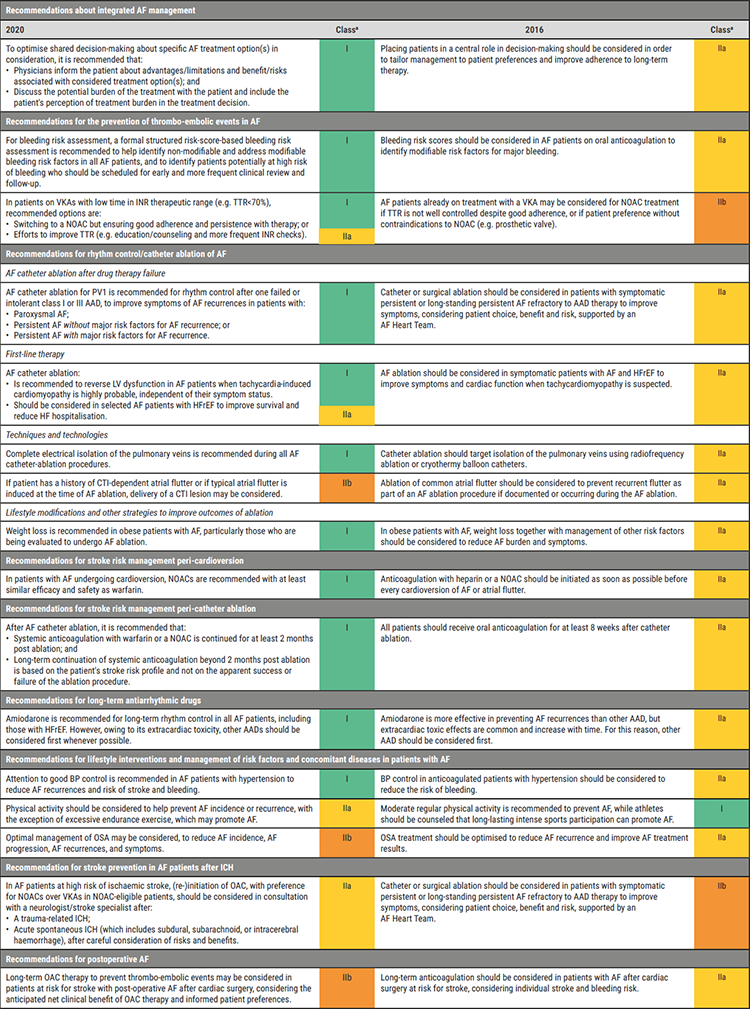The new 2020 guidelines were presented at the ESC Congress 2020 by Prof. Gerhard Hindricks (Guidelines Task Force Chair; Heart Centre Leipzig, Germany), and published simultaneously online in the European Heart Journal [1,2]. “Patients want to be involved in decisions about their care and their preferences should be respected,” said Prof. Hindricks.
Central to the new guidelines is an individualised approach to the Atrial fibrillation Better Care (ABC) pathway:
- Anticoagulation/Avoid stroke refers to anticoagulation medication for the prevention of stroke where risk is indicated.
- Better symptom management strives to manage heart rate and heart rhythm with medications and procedures.
- Cardiovascular and Comorbidity optimisation covers high blood pressure management and lifestyle changes including smoking cessation, weight management, and exercise.
An individualised care plan should be formulated to address patient preferences and physical characteristics. Prevention of stroke remains an essential component for most patients. This year’s update gave additional consideration to specific patient characteristics. For example, pregnant women with AF taking warfarin should avoid vaginal delivery, and endurance athletes are at higher risk for AF, but those participating in contact sports should avoid oral anticoagulants due to bleeding risk.
Accumulating data concerning population screening to identify people with previously undiagnosed AF suggests pre-symptomatic intervention to prevent stroke in these individuals is effective. Wearable devices (e.g. smart wrist bands coupled with smartphone apps) are a remarkable breakthrough, but the guidelines caution that many are not clinically validated for AF detection. A summary of changes in the guidelines from 2016 to 2020 are summarised in the Table.
Table: Summary of AF Guideline changes from 2016 to 2020 [2]

Reprinted from Hindricks G, et al. Eur Heart J. 2020 [Epub ahead of print]. Copyright 2020, with permission from Oxford University Press.AAD, antiarrhythmic drug; AF, atrial fibrillation; NOAC, non-vitamin K antagonist oral anticoagulant; OAC, oral anticoagulant; OSA, obstructive sleep apnoea; PCI, percutaneous coronary intervention; PRO, patient-reported outcome; VKA, vitamin K antagonist therapy.
aClass of recommendation.
- Hindricks G, et al. 2020 ESC Guidelines on Atrial Fibrillation. 2020 New ESC Guidelines, ESC Congress 2020, 29 Aug.
- Hindricks G, et al. Eur Heart J. 2020;ehaa612.DOI:10.1093/eurheartj/ehaa612.
Posted on
Previous Article
« 2020 Non-ST-Segment Elevation Acute Coronary Syndromes Guidelines Next Article
Letter from the Editor »
« 2020 Non-ST-Segment Elevation Acute Coronary Syndromes Guidelines Next Article
Letter from the Editor »
Table of Contents: ESC 2020
Featured articles
2020 ESC Clinical Practice Guidelines
2020 Atrial Fibrillation Guidelines
2020 Non-ST-Segment Elevation Acute Coronary Syndromes Guidelines
2020 Sports Cardiology and Exercise in Cardiovascular Patients Guidelines
2020 Adult Congenital Heart Disease Guidelines
Hot Line Presentations
SGLT2 inhibitor improves cardiovascular outcomes in heart failure patients
First-in-class cardiac myosin inhibitor effective in obstructive hypertrophic cardiomyopathy
Reduced cardiovascular outcomes with early rhythm control
Trimetazidine after successful PCI not associated with fewer cardiac events
POPular TAVI: Aspirin-only antiplatelet strategy?
Reduced NT-proBNP in HFpEF with sacubitril/valsartan
DAPA-CKD: Dapagliflozin improves CKD survival ± diabetes
Low-dose colchicine reduces CV death and ischaemic events in coronary disease
Similar outcomes sPESI and HESTIA for pulmonary embolism triage
Antihypertensives also reduce CV risk in people with normal blood pressure
COVID-19: Continuing versus suspending ACE inhibitors and ARBs
Drug initiation strategy not associated with increased use of oral anticoagulants
Restrictive blood transfusion non-inferior and cost-effective strategy
Late-Breaking Science
Increased mortality with colchicine in patients with ACS
Rivaroxaban protects limbs and ischaemic events in CAD-PAD patients
Antisense APOC3 oligonucleotide lowers triglyceride and atherogenic lipoproteins
Antisense ANGPTL3 lowers triglycerides
Reduced progression of coronary atherosclerosis with icosapent ethyl
Digoxin improves symptoms in stable patients with permanent AF
SGLT2 inhibitor ertugliflozin shows similar mortality but fewer HF hospitalisations
COVID and Cardiovascular Disease
Risk factors for thromboembolism and bleeding in COVID-19: lessons from Wuhan
The Yale COVID-19 Cardiovascular Registry
COVID-19 treatments and the importance of randomised trials
Related Articles
November 5, 2020
Digoxin improves symptoms in stable patients with permanent AF
November 5, 2020
2020 Non-ST-Segment Elevation Acute Coronary Syndromes Guidelines
November 5, 2020
Similar outcomes sPESI and HESTIA for pulmonary embolism triage
© 2024 Medicom Medical Publishers. All rights reserved. Terms and Conditions | Privacy Policy

